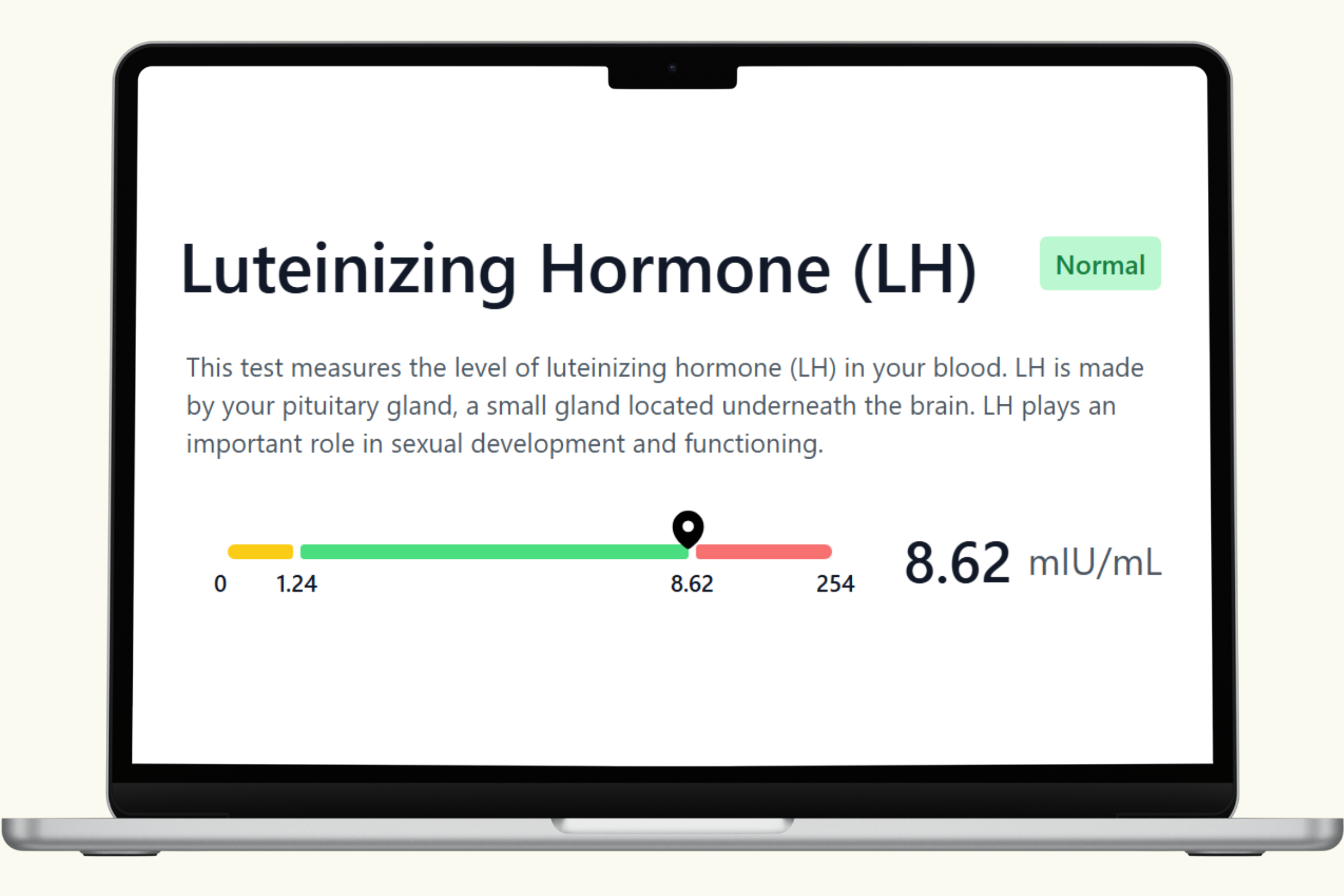Luteinizing Hormone (LH) Blood Test: A Key Marker of Reproductive Health
The Luteinizing Hormone (LH) Blood Test, part of the PlexusDx Women’s Hormone Blood Test, measures levels of LH, a pituitary hormone essential for fertility, menstrual cycle regulation, and overall reproductive health. Because LH interacts closely with estradiol and progesterone, it provides critical insight into ovulation, menstrual irregularities, and hormone balance.
What is Luteinizing Hormone (LH)?
LH is produced by the pituitary gland at the base of the brain. Although both men and women produce LH, its roles differ by sex. In women, LH helps regulate the menstrual cycle and reproduction. In men, it stimulates testosterone production in the testes. This blog will focus on the role of LH in women’s health, as measured in the PlexusDx Women’s Hormone Blood Test.
Functions of LH in Women
- Estradiol Production: LH works with follicle-stimulating hormone (FSH) to stimulate the ovaries to produce estradiol during the follicular phase of the menstrual cycle.
- Ovulation: A mid-cycle “LH surge” triggers ovulation, the release of a mature egg from the ovary. This surge is one of the most important signals for fertility.
- Progesterone Support: After ovulation, LH promotes the corpus luteum to produce progesterone, which is needed to prepare the uterus for implantation and support early pregnancy.
- Menopause Transition: As ovarian function declines, LH levels rise, making LH an important marker of menopause.
Why Test LH?
Doctors may recommend an LH blood test in several situations:
- Fertility Concerns: To confirm whether ovulation is occurring and identify causes of infertility.
- Irregular Menstrual Cycles: To evaluate skipped or irregular periods, heavy bleeding, or unpredictable cycles.
- Polycystic Ovary Syndrome (PCOS): Women with PCOS often have elevated LH relative to FSH, which disrupts ovulation.
- Menopause Assessment: Elevated LH is a natural marker of reduced ovarian function.
- Pituitary Disorders: Abnormal LH may signal pituitary gland dysfunction.
- Low Sex Drive or Hormonal Imbalances: LH testing helps uncover the root causes of reduced libido or hormonal symptoms.
Reference Ranges for LH
Like estradiol and progesterone, LH levels vary depending on the menstrual cycle phase, age, and menopausal status. Below are commonly used reference ranges (IU/L):
- Follicular Phase: 1.9 – 12.5 IU/L
- Mid-Cycle Peak (Ovulation): 8.7 – 76.3 IU/L
- Luteal Phase: 0.5 – 16.9 IU/L
- Postmenopause: 15.9 – 54.0 IU/L
Functional Ranges for Optimal Health
Functional medicine practitioners sometimes use tighter “optimal” ranges to evaluate hormone balance more precisely:
- Follicular Phase (Optimal): 2 – 8 IU/L
- Luteal Phase (Optimal): 1 – 10 IU/L
- Ovulation (Optimal LH Surge): 20 – 60 IU/L
Values outside these ranges may indicate ovulatory dysfunction, PCOS, or perimenopausal changes.
Symptoms of Abnormal LH Levels
- Low LH: Missed or irregular periods, infertility, low libido, fatigue, and signs of pituitary dysfunction.
- High LH: May indicate menopause, PCOS, or ovarian insufficiency. Symptoms can include hot flashes, irregular cycles, difficulty conceiving, and mood swings.
How the PlexusDx LH Blood Test Works
The PlexusDx Women’s Hormone Blood Test uses a convenient at-home dried blood spot collection method with an ADX card:
- Collect a few drops of blood with a simple finger prick.
- Apply the blood to the ADX collection card.
- Mail the card back using the included pre-paid envelope.
This process makes hormone testing simple, private, and accurate, with results processed by certified laboratories.
How to Interpret Results
LH results should always be interpreted in relation to your menstrual cycle phase, age, and other hormone levels (such as FSH, estradiol, and progesterone). For example, high LH with low FSH may suggest PCOS, while very high LH with low estradiol and progesterone may indicate menopause. Your healthcare provider will review your results in context to determine whether additional testing or treatment is needed.
Ways to Support Healthy LH Levels
- Balanced Nutrition: Adequate protein, healthy fats, and micronutrients support hormone production.
- Stress Management: Chronic stress can suppress LH release. Relaxation techniques may restore balance.
- Healthy Weight: Both underweight and overweight states can disrupt LH signaling and ovulation.
- Medical Treatments: Depending on the underlying cause, treatments may include medications for PCOS, hormone therapy for menopause, or fertility treatments to support ovulation.
Key Takeaways
- The LH Blood Test measures luteinizing hormone, a pituitary hormone critical for ovulation, fertility, and reproductive health.
- Levels fluctuate during the menstrual cycle, peaking during ovulation and rising naturally after menopause.
- Doctors use LH testing to evaluate fertility, menstrual irregularities, PCOS, pituitary disorders, and menopause.
- The PlexusDx Women’s Hormone Blood Test uses at-home dried blood spot collection for fast, accurate results.
- Understanding your LH levels empowers you to address fertility concerns, hormone imbalances, and overall reproductive wellness.
By testing LH with PlexusDx, you gain essential knowledge about your reproductive cycle and hormone health, helping you take proactive steps toward balance, fertility, and long-term wellness.

Share:
Estradiol (E2) Blood Test
Follicle-Stimulating Hormone (FSH) Blood Test